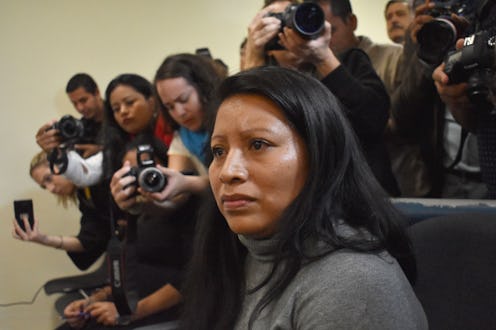News
A Salvadoran Woman Who Says She Suffered A Stillbirth Is Being Treated Like A Criminal

In the country of El Salvador, abortion has been strictly illegal since 1998, meaning nearly a whole generation of Salvadoran women have been denied reproductive rights for nearly two decades. And the country's strident ban on abortion has had some considerable consequences for women who suffer miscarriages, like Teodora del Carmen Vásquez. Sentenced to prison in 2007 after suffering a stillbirth that El Salvador maintained was an abortion, Vasquez just found out her 30-year prison sentence won't be overturned, meaning she still has 20 years left to serve behind bars.
According to a report by Jesselyn Cook for HuffPost on Thursday, Vasquez, 34, was pregnant in 2007 when she fainted, and awoke to find herself bloodied and surrounded by police officers. She was charged with terminating her pregnancy, a crime in El Salvador punishable by decades behind bars.
In El Salvador, both the woman receiving the abortion and any medical professional aiding her are criminalized; doctors can receive up to 12 years in prison for taking part, but the woman, as in Vasquez's case, often bears the worst brunt of the punishment. The criminalization of doctors creates a downward pressure, in which medical practitioners sometimes have incentive to turn in their patients to law enforcement authorities.
Vasquez filed an appeal in the hopes of having her sentence overturned, already having spent the last 10 years imprisoned for the stillbirth. It was rejected, however, meaning (as it stands now, at least) she continues to face another 20 years behind bars. El Salvador's abortion ban makes no exceptions, not even for rape victims, nor in cases when the mother's life may be at risk.
Amnesty International, in particular, has been outspoken in advocating for Vasquez to be freed. Following the news that her appeal was denied, the organization's Americas Director, Erika Guevara-Rosas, released the following statement, taking dead aim at the country's hyper-repressive abortion ban:
Teodora’s tragic story is a sad illustration of everything that is wrong with the justice system in El Salvador, where human rights seem to be a foreign concept. Instead of punishing Teodora for being a woman, authorities in El Salvador must urgently take a hard look at their outrageous anti-abortion law and take immediate steps to repeal it.
At the time of this writing, according to Reuters, there are 28 women currently imprisoned by the Salvadoran government for reasons allegedly related to abortion, with Vasquez being one of them. Advocates have long claimed that women who've suffered miscarriages, stillbirths, and pregnancy complications have been prosecuted as well, however.
This isn't the only harrowing story relating to El Salvador's abortion ban that's come out this year. As Amnesty International detailed back in July, the country's courts just handed down a 30-year prison sentence for "aggravated homicide" against a 19-year-old rape survivor who lost her ensuing pregnancy due to complications. She was reportedly unaware she was pregnant when she fainted, was taken to the hospital, and reported to law enforcement by the medical staff.
These kinds of stories are a stark reminder of the stakes at play in the battle over women's reproductive rights across the globe, including in the United States. The Salvadoran system is essentially the purest judicial vision of what anti-abortion activists and legislators are driving at when they claim that abortion is "murder."
Enacted as a matter of government policy, that view ― that terminating a pregnancy is the same thing as murdering a human being ― unavoidably and inevitably leads to the kind of logical extremes that have been in effect in El Salvador for nearly 20 years. Namely, these extremes could include decades-long prison sentences for women who either terminate their pregnancies or lose them for reasons beyond their control. And until El Salvador re-examines and reforms how it views women's reproductive rights, there's no reason to think these sorts of draconian punishments against its women are going to change.